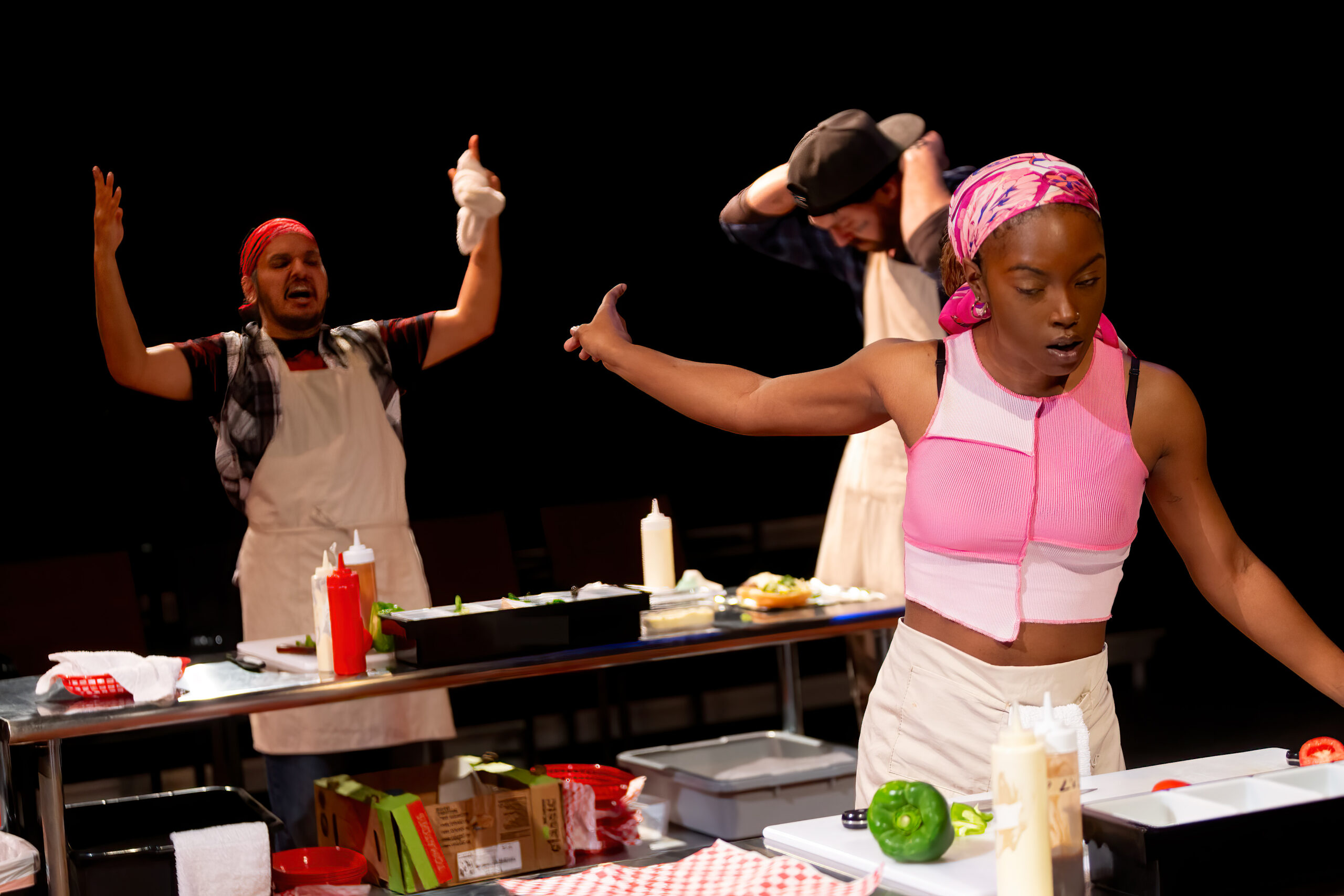Ground Floor Theatre is one of my favorite venues in town. I like the cozy lobby and the chardonnay they offer. I honestly even like going down the outdoor hallway to the bathrooms. I like that parking is easy (if it is a little Wild West in the backside of the buildings). Mostly, I love that the black box gets used as a black box should: it looks different every time I see it.
For their production of Lynn Nottage’s Clyde’s, Carl and Lacey Cannon Gonzales have put the audience on three sides of the stage and dressed it as the kitchen of the titular greasy spoon, complete with a sizzling grill, an old boom box (with a great soundtrack by sound designer Johann Solo), and a litany of actual food props for the actors. There’s fresh produce, myriad sauces, cans of who knows what lining the shelves (credit to Liz Tyson). The script and direction keep the actors slicing, dicing, smashing, spitting, tossing, and devouring their food throughout; the deftness with which each of them handles their props is as impressive as any other element of their acting.
The whole cast – all five of them! – are impressive, but Vivian Noble as Letitia stands out. Nottage’s words flow naturally; Noble’s Letitia is frustrated, but never jaded; surprisingly sensitive; quick to judge, but equally as quick to apologize. She dances, and the whole room is enamoured; she threatens, and the whole room listens. Of all the wild personalities in Clyde’s kitchen, Noble’s feels the most dynamically human.
The truck stop diner we see run by mean, authoritarian Clyde (Yunina Barbour-Payne) is a landing place for folks fresh out of prison. Clyde is, we learn, the only person that will hire felons because she is also a felon. But her hiring practices aren’t altruistic – she mistreats and abuses her cooks precisely because, as they are well aware, there is nowhere else for them to go. The purgatorial kitchen is host to a daily battle of wits between Clyde and anyone who will dare stand up to her. Her true opposite is Montrellous (Zell Miller III), who floats in and out of the kitchen, culinary experiments in hand, and offers Buddha-like wisdom to his friends: slow down, he says; the sandwich can feel your anger. When Montrellous encourages self-forgiveness and patience, Clyde scoffs and cites “the real world” as proof that she needn’t change her ways. Every other character eventually tells their story throughout the action of the play. We hear of homelessness, of drug abuse, single motherhood, incarceration – and yet it’s not a dark play. It’s a play about sandwiches! (Even if the sandwiches turns out to be a metaphoric device.) It seems cliche to claim that no one is defined by their past, but I think that’s exactly the play’s point.
The final moments of the play are truly the only moments I didn’t like. Of course, I love a good Weird Ending To A Contemporary Play as much as the next person. Give me a group inhale, a whispered final line, a suggestion that it might have all been a dream. I’m your key audience! In Clyde’s, each cook gets a chance to add their own ingredient to one final sandwich (see, I told you it was a metaphor) before leaving the stage and the kitchen for the last time. But Clyde herself has her final moments engulfed in…flames. Was the purgatory metaphor supposed to be more pronounced than I thought? Was the pyrotechnic effect too expensive to use only once per night?
My questions aside, Clyde’s is a solid piece of theater. It advertises a good time, and it is a good time – with a side of honesty, raw emotion, and a lesson in empathy. And a perk? It’s short. The ticket link advertises that the show runs 90 minutes; it actually ran an hour and fifty minutes. (Still, two different audience members got out of their seats and left at different times – but my audience behavior pet peeves are another topic for another post.)
Photo: Steve Rogers Photography
Clyde’s runs through June 1 at Ground Floor Theatre. For more information and tickets, visit GFT online.


Leave a Reply
You must be logged in to post a comment.